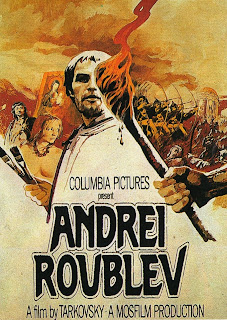My contribution to Ryan McNeil's 2015 blindspot series blogathon, where I watch a film each month that I have never seen before.
Andrei Rublev (1966) is set in medieval Russia, and loosely based on the life and times of the legendary 15th century Russian icon painter. The story takes place during a turbulent period of Russian history.
Considered a masterpiece of world cinema. My experience is writer/director Andrei Tarkovsky wanted to speak timeless wisdom through his characters. The dialogue does feel a bit pretentious and like a philosophical essay at times. The main characters tend to blend together talking the same way, especially in the first half of the film.
It’s not all dialogue. Visually the film is striking, particularly a scene where a man flies across the sky, and also several battle scenes of the Tartars raiding the Russians. Another memorable scene involves a jester the travelers meet while it’s raining. He entertains a gathering with jokes and physical comedy.
The second half of the film is easier to follow, relying less on dialogue and more on visual storytelling. About Rublev’s personal and religious crises which prevents him from painting. Also about a boy in charge of casting a copper bell for the Grand Prince. The boy explains he was given this knowledge by his deceased father. The bell has deep religious and cultural significance. If the film has a weakness it's that it points in many directions and can be disorientating to watch. A second viewing seems necessary.
Animals depicted such as horses and snakes appear to have a symbolic quality. It’s probable the struggles the characters are going through is a parallel to Russia in the 1960s, in that free spirits are oppressed by the authorities. There is something elusive about the meaning of the film, and much has been written. Perhaps director/writer Tarkovsky could identify with another artist (Andrei Rublev), who created art under a repressive regime. As it says in 1001 Movies You Must See Before You Die, it's about man’s relationship to God, the artist’s relationship to the public, the artist and the art, and Russia as a physical and metaphysical place.
Among Tarkovsky’s deepest and technically most ambitious films. It’s tricky to label the genre. A combination of think piece, biopic and war film. The end scene gives us examples of Rublev's artwork.
Tarkovsky on Andrei Rublev: “In any case I knew it would certainly not be a historical or biographical work. I was interested in something else: I wanted to investigate the nature of the poetic genius of the great Russian painter. I wanted to use the example of Rublev to explore the question of the psychology of artistic creativity, and analyze the mentality and civic awareness of an artist who created spiritual treasures of timeless significance” (Sculpting in Time, 1984)
Agree or disagree? Have you seen Andrei Rublev, and what did you think? Which is your favorite Tarkovsky film?


It sounds like you liked this more than I did. I prefer other Tarkovsky films more (i.e. Stalker, Solaris).
ReplyDelete@Chip Lary: Andrei Rublev impressed me, even if it’s disorientating in terms of story and thematically.
DeleteI also like Tarkovsky’s sci-fi/futuristic works Solaris and Stalker, which to me are more focused with fewer characters. I may review them at some point.
For me, this was an absolute achievement in film and certainly one of Tarkovsky's finest. It's got ambition and was willing to take great risks. I love it.
ReplyDelete@thevoid99: Not many Russian films are as ambitious as this one, a remarkable achievement considering the censorship when it was made, and its aged well(like many of his films have)
DeleteI have this on my DVR and am looking forward to finally watching, especially after reading this review!
ReplyDelete@Fisti: Glad my review has encouraged you to watch the film!
DeleteNot my favorite Tarkovsky, which would probably be Ivan's Childhood, but I really admired the film's visuals, especially in the second half. I need to watch it again some time, though.
ReplyDelete@Josh: Andrei Rublev indeed deserves praise for the visuals and sheer ambition on display. Ivan's Childhood is on my watchlist
ReplyDelete